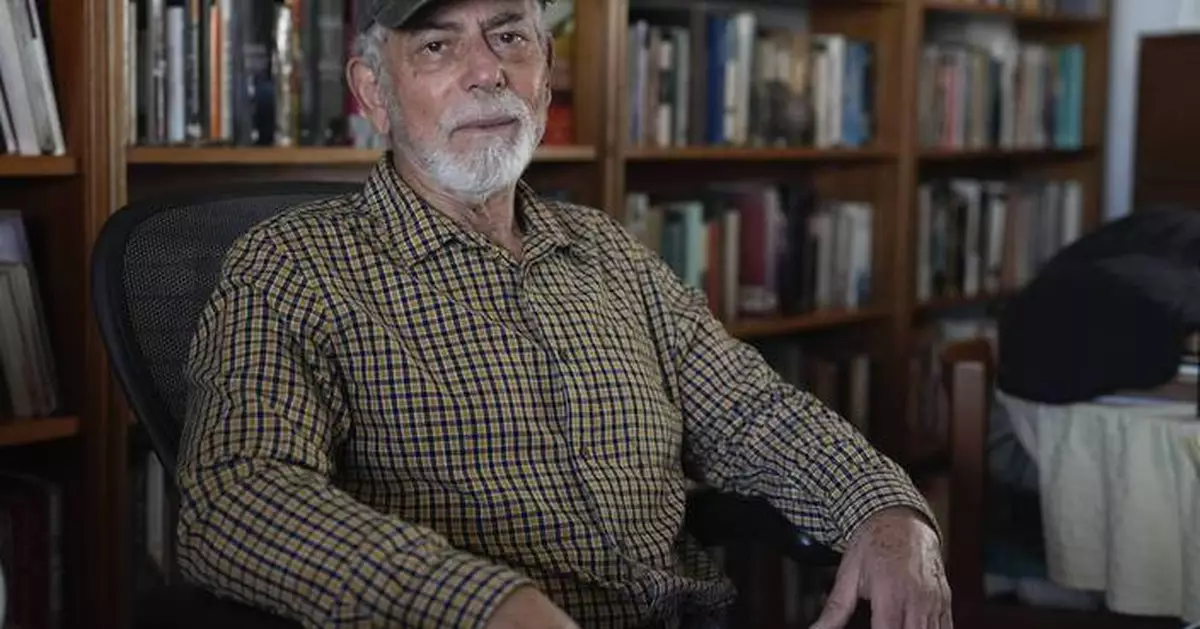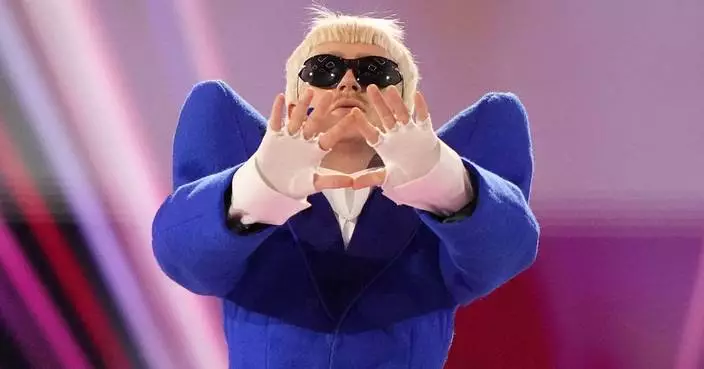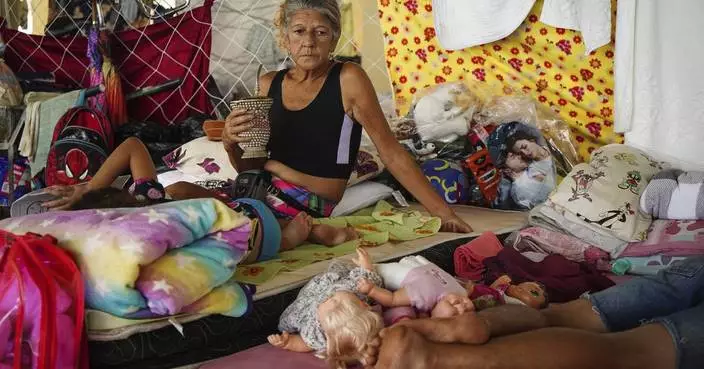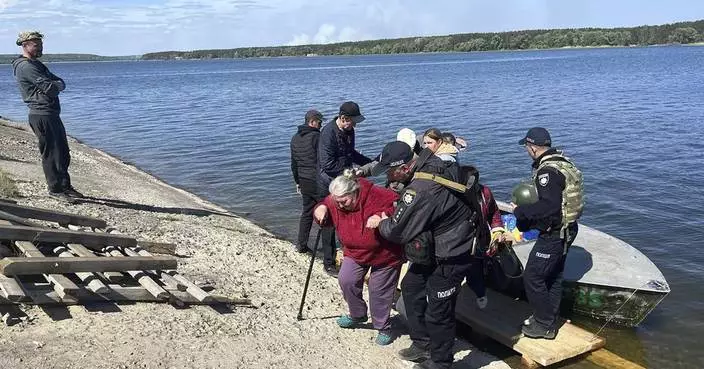LIMA, Peru (AP) — At age 75, one of Latin America’s most storied journalists had been looking forward to weaving into books the fragmented threads of more than four decades of investigative reporting that exposed high-level abuse of power in Peru and abroad.
In an illustrious career, Gustavo Gorriti has endured death threats from drug traffickers, survived Peru's harrowing Shining Path insurgency and a kidnapping by silencer-toting military intelligence agents during a 1992 presidential power grab.
Then an aggressive lymphatic cancer struck, wasting the former five-time national judo champion's robust physique. Diagnosed in August, Gorriti was in the final drips of two months of chemotherapy in December when a different kind of body blow landed.
A smear campaign — amplified by complicit, cowed or indifferent broadcast and print media — portrayed the self-styled “intelligence agent for the people” as Public Enemy No. 1, a ruthless, egotistical victimizer of innocents.
Gorriti is clear on who is behind it: A cabal of “kleptocrats” in Peru's political and business elites who are in prosecutorial peril due in large part to his crowning gumshoe achievements. Their aim: “to liquidate all gains in the war on corruption."
With his hair gone from the chemo, his trademark white beard down to “like three hairs," Gorriti said he "looked like a pathetic Fu Manchu.” He was so debilitated “I only wanted to sleep,” he said in an interview on the terrace of his Lima apartment.
But indignation stirred the pugilistic reporter to action, marshaling his team at IDL-Reporteros, an online news site, to mount a vigorous, detailed defense.
“You don’t get to choose when you go to war,” he said.
Then it got worse. By March 27, Gorriti was facing a criminal investigation in a bizarrely framed bribery case, accused of “favoring" two anti-corruption prosecutors with publicity.
“Of course it's not true,” one of the prosecutors cited, José Domingo Pérez, told The Associated Press. “This is a blatant attempt to muzzle one of Latin America’s best investigative reporters, the outlet that he has founded, and, by extension, any journalist who would dare to speak truth to power in Latin America," The Washington-based National Press Club said in a statement co-signed by seven press and human rights groups.
The Committee to Protect Journalists and France-based Reporters without Borders also protested.
The case could hurt prosecutions in an epic bribery scandal implicating five former presidents and Keiko Fujimori, the eminence grise of Peruvian politics and a perennial presidential candidate who came within a hair of winning the job in 2021. Her trial is set for July 1.
It was Fujimori's father, Alberto, whose agents kidnapped Gorriti to silence him as the autocrat shuttered Congress by force in a 1992 presidential power grab. An international outcry got the reporter promptly released.
The prosecutor now targeting Gorriti has demanded his communications with Pérez and fellow anti-corruption prosecutor Rafael Vela from 2016-2021. Gorriti is refusing, citing reporter's privilege, but fears he could get a judicial order.
After years of democratic backsliding, “a loose coalition of corrupt actors" has captured enough institutions that referee Peruvian political life to weaponize them against rivals, said Steven Levitsky, co-author of “How Democracies Die” and a Harvard professor. “And that’s exactly what’s happening with Gustavo.”
It’s straight out of the authoritarian playbook battering democracies and imperiling reporters globally.
Regional examples include Venezuela, Nicaragua and Guatemala, where the journalist Jose Zamora is imprisoned on what press freedom groups call a trumped-up money laundering conviction designed to muzzle him. Another emblematic case: Nobel Peace Prize-winning Filipino journalist Maria Ressa.
Gorriti's enemies have been trying to discredit him — including with claims he sympathizes with leftist terrorists — since he began unmasking politicians bribed by the Brazilian construction conglomerate Odebrecht in Latin America's biggest corruption scandal ever. Dubbed “Lava Jato” after a Brazilian car wash, it saw roughly $788 million in bribes associated with more than 100 public works projects paid in 12 countries including Argentina, Panama, Colombia, Ecuador, Mexico, Guatemala and Venezuela; $29 million went to Peruvian officials from 2005-2014, according to the U.S. Justice Department.
To unearth its machinations outside Brazil, Gorriti recruited reporters from multiple countries and personally traveled there. Ensuing prosecutions have varied by country. If not for pressure from Gorriti’s team and other journalists, the Peruvian cases might have faltered, said Pérez, the anti-corruption prosecutor.
“In 2017, the chief prosecutor's office didn't want to investigate Keiko Fujimori,” he added.
Gorriti won hero status, standing ovations at book fairs and hugs in the street.
But with Lava Jato cases now coming to a head – every elected 21st-century Peruvian president is implicated – gatherings outside Gorriti’s home and IDL Reporteros offices have taken on a different, sinister tone: Street toughs hurling insults and even bagged excrement.
The probe of Gorriti was solicited by an unusual alliance of the party of Keiko Fujimori and its longtime nemesis, that of former President Alan García.
Ensnared in the Odebrecht scandal over rail projects, García shot himself in the head in 2019 rather than surrender to police after Uruguay's embassy denied him refuge. His loyalists claim Gorriti and the anti-corruption prosecutors "criminally entrapped” him.
That's absurd, says Gorriti. After the suicide, reporters determined that García told friends and family he would take his life to avoid the public humiliation.
The frenzy of demands for Gorriti’s head flow from unsubstantiated tales slung by Jaime Villanueva, a former adviser to a suspended chief national prosecutor.
Villanueva unleashed the accusations after coming under investigation for alleged crimes including bribery and influence-trafficking and agreed to testify against his former boss in exchange for favorable treatment. Neither he nor the prosecutor who launched the investigation against Gorriti, Alcides Chanchay, responded to AP interview requests.
After working with then-chief prosecutor Patricia Benavides to try to choke anti-corruption efforts, Villanueva counseled lawmakers on crippling judicial independence, Gorriti says. “The guy had a trajectory Judas Iscariot would have envied.”
Gorriti has a knack for stirring hornet's nests.
While exiled in Panama, then-President Ernesto Balladares tried to expel Gorriti in 1997 after investigations he led at the local newspaper La Prensa uncovered high-level corruption including trafficking in Chinese workers.
“Generally, Latin politicians don’t care if you call them thieves, tyrants, shameless, God’s punishment, whatever," Gorriti told the AP at the time. "What matters a lot to them is substantive journalism. They’re not accustomed to it.”
In the citation for a 1998 press freedom award, the Committee to Protect Journalists called Gorriti “Latin America's top investigative reporter.”
International pressure could certainly help now. Gorriti is regaining strength after good results from immunotherapy begun in February. His hair has mostly grown back. But the relative silence of Peruvians worries him.
They generally despise the president, Dina Boluarte, and Congress. Polls show more than nine in 10 want them gone. But political gridlock has delayed new elections. Pedro Castillo, the last elected president, was impeached in 2022 for trying to dissolve Congress. Troops then killed at least 40 people in ensuing protests.
Peruvians are demoralized by all the corruption and still addled from the COVID-19 pandemic, Gorriti says. No country suffered a higher per-capital death rate. And they've had six presidents in six years.
Gorriti, who published a book about the Shining Path insurgency in 1990, believes that just as Peruvians have failed to reckon with the group's rise so have they avoided examining their inadequacies in confronting the pandemic.
In the late 1990s, they rallied to drive a disgraced and discredited Alberto Fujimori into exile. He and his intelligence chief, Vladimiro Montesinos have since been convicted of multiple felonies – including in the 1992 Gorriti abduction.
If Gorriti were to wind up jailed, perhaps Peruvians might again be stirred to action.
Suppressing an intermittent cough, Gorriti expressed hope his case can mark a milestone for freedom of expression and democracy.
As he told Colombian journalist Maria Jimena Duzan in a recent podcast, “If I need to do battle in my old age, well, so be it. Old folks can fight, too.”
Frank Bajak was AP’s chief of Andean news from 2006-2016.
Associated Press writer Franklin Briceno contributed to this report.

Journalist Gustavo Gorriti poses for a portrait at his home in Lima, Peru, Friday, April 26, 2024. Gorriti, 75, is one of Latin America’s most storied journalists with more than four decades of investigative reporting that exposed high-level abuse of power in Peru and abroad. (AP Photo/Martin Mejia)

Journalist Gustavo Gorriti poses for a portrait at his home in Lima, Peru, Friday, April 26, 2024. Gorriti, 75, is one of Latin America’s most storied journalists with more than four decades of investigative reporting that exposed high-level abuse of power in Peru and abroad. (AP Photo/Martin Mejia)

Journalist Gustavo Gorriti poses for a portrait at his home in Lima, Peru, Friday, April 26, 2024. Gorriti, 75, is one of Latin America’s most storied journalists with more than four decades of investigative reporting that exposed high-level abuse of power in Peru and abroad. (AP Photo/Martin Mejia)











